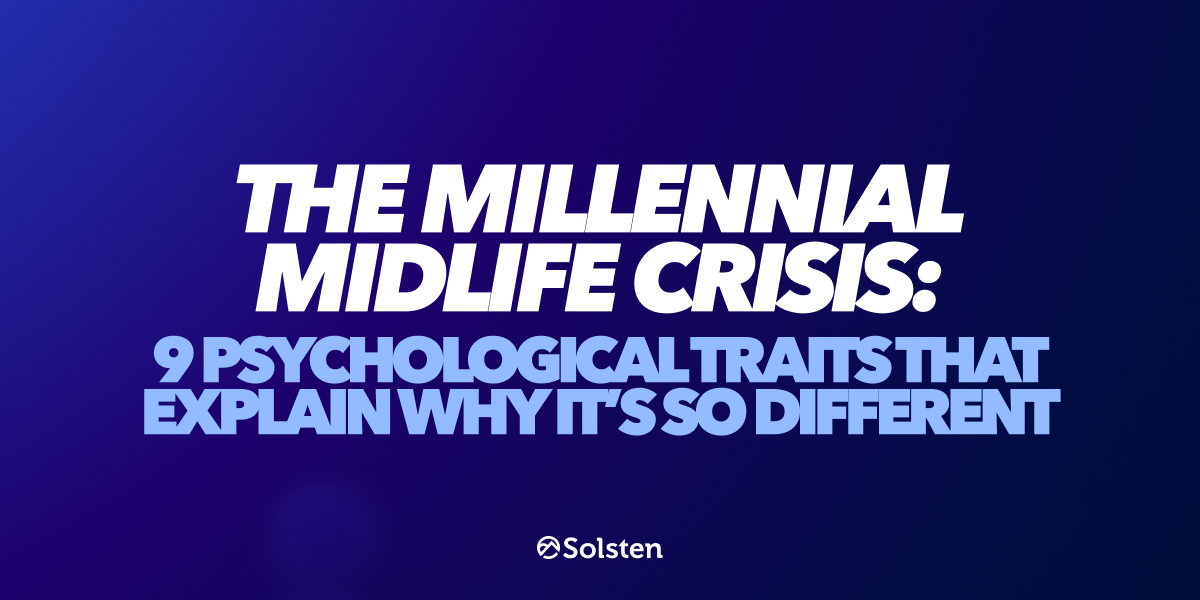As Millennials enter their 30s and 40s, they’re creating a midlife experience that bears little resemblance to what their parents experienced at the same age. The stereotypical midlife crisis, characterized by impulsive decisions, existential dread, and grasping attempts to recapture youth, is being replaced by something entirely different.
Born roughly between 1981 and 1996, Millennials came of age during profound technological and economic shifts. They witnessed the birth of the mainstream internet, navigated the Great Recession as young adults, and experienced the emergence of social media and smartphones during their formative years. By 2025, Millennials range from 29 to 44 years old, and are firmly established in what traditional timelines would consider “midlife.”
What’s particularly notable in our 2025 data is how several key Millennial psychological traits have evolved over just the past year. We’re seeing significant increases in traits like Independence, Self-Assurance, and Trust, suggesting that as this generation solidifies their midlife identity, they’re leaning even more into their distinctive psychological profile.
Let’s explore the 10 key psychological traits that explain why Millennials are redefining the midlife crisis.
The data in this article is drawn from Solsten’s ongoing psychological assessment, representing 3.4 billion people globally. Each trait is expressed as a percentile on a scale from 0-100, offering a quantitative insight into Millennial psychographics. You can learn more about Solsten’s methodology and data collection here.
Explore Millennial psychology and other generational insights instantly
The Millennial analysis below showcases the depth of psychological understanding possible with our data. Now you can access these insights through conversation with Elaris. Ask questions like “How do Millennial managers differ from Gen X managers?” or “What psychological traits drive Millennial consumer behavior?”
Get instant insights from the world’s largest psychological database.
Discover generational psychology insights
1. Independence: Autonomy as a Core Value
Data Point: Millennial men score 57 on Independence, higher than any other generation
Millennials score notably high on Independence, the psychological trait measuring preference for self-reliance and autonomy. This characteristic fundamentally shapes how they approach midlife decisions, from career to relationships.
Unlike their parents, who often measured midlife success through specific shared milestones like executive titles, suburban homes, college funds, Millennials’ high independence creates comfort with forging personalized paths through their 30s and 40s.
This manifests in what sociologists call “milestone agnosticism,” which is the belief that life achievements can happen in any order, at any time. Marriage at 40? Starting a business at 35? Going back to school at 38? For Millennials, these aren’t “delayed” milestones but simply different timelines aligned with their more independent approach to life stages.

Year-Over-Year Trend: Millennial women’s independence scores increased by 4 points year over year, while men’s increased by 8 points — among the largest increases in any trait. This suggests that as Millennials establish themselves in midlife, their psychological independence is actually strengthening rather than conforming to traditional midlife patterns.
2. Actions: Openness to New Experiences
Data Point: Millennial women score 59 and men score 69 on Actions, highest of any generation
The psychological trait “Actions” measures openness to new experiences and willingness to try new approaches. Millennials score remarkably high on this trait, with men scoring 69 and women 59.
This trait explains why Millennials approach midlife transitions so differently than previous generations. Rather than fearing change, their high Actions scores indicate they’re psychologically wired to embrace new experiences and adapt to changing circumstances.
This characteristic manifests in career patterns that would have seemed chaotic to previous generations. LinkedIn data shows the average Millennial will hold 12-15 jobs in their lifetime. By midlife, many have already navigated multiple career changes, treating each transition as growth rather than disruption.
The gender gap here is revealing. Millennial men score significantly higher, suggesting men in this generation may be even more comfortable with dramatic changes and new experiences than their female counterparts.

3. Self-Assurance: Confidence Amid Uncertainty
Data Point: Millennial women score 54 and men score 59 on Self-Assurance, the highest of any generation.
Despite coming of age during economic turbulence, Millennials demonstrate surprisingly high Self-Assurance scores — 54 for women and 59 for men. This psychological trait measures confidence in one’s abilities and decisions.
This trait helps explain Millennials’ comfort with unconventional life choices at midlife. Their self-assurance helps them make decisions that might seem risky by traditional standards — changing careers, relocating, or reinventing themselves — with confidence in their ability to succeed.
This manifests in midlife behaviors like “career pivoting” to entirely new industries or roles based on interest rather than necessity. It also explains Millennials’ entrepreneurial tendencies at midlife, with Small Business Administration data showing peak entrepreneurship now occurring in the mid-30s rather than mid-20s.
The gender difference (men scoring five points higher) reflects lingering confidence gaps, though both genders show strong self-assurance overall.
Year-Over-Year Trend: Millennial self-assurance scores have increased significantly in the past year — up 3 points for women and 4 points for men. This growth in confidence runs counter to traditional midlife patterns of increased doubt and reconsideration, suggesting Millennials are becoming more self-assured as they establish their midlife identity.
Want to track psychological trends across other demographics? Elaris lets you explore evolving psychological patterns through simple conversation. Explore trends.
4. Long-Term Orientation: Strategic Patience
Data Point: Millennial women score 48 and men score 49 on Long-Term Orientation
The psychological trait Long-Term Orientation measures preference for delayed gratification and future planning. Millennials score moderately high on this trait (women: 48, men: 49), with minimal gender difference.
This trait explains Millennials’ strategic approach to major life decisions in their 30s and 40s. Rather than making impulsive midlife decisions (the classic “midlife crisis” red sports car), their Long-Term Orientation drives more calculated choices with future benefits in mind.
This manifests in financial behaviors like prioritizing experiences over possessions, strategically delaying homeownership in high-cost areas, and creating flexible retirement strategies rather than traditional fixed plans. It also explains their approach to education as a lifelong investment rather than a one-time endeavor completed in youth.
The near identical scores between genders suggests this strategic patience crosses gender lines, creating shared approaches to long-term planning in Millennial partnerships.
Year-Over-Year Trend: While most generations saw decreases in Long-Term Orientation between 2023-2024, Millennials demonstrated relative stability in this trait. Millennial females saw a statistically insignificant decrease compared to much larger drops in other generations, while Millennial males experienced a moderate decline of -2. This relative stability suggests Millennials are maintaining their future-focused perspective despite broader societal shifts toward short-term thinking.
5. Flow: Immersion in Meaningful Activities
Data Point: Millennial women score 47 and men score 42 on Flow, highest of any generation
The psychological trait Flow measures ability to become deeply engaged in meaningful activities. Millennials show strong scores in this area, with women scoring 47 and men 42.
This characteristic helps explain Millennials’ prioritization of meaningful engagement over status or traditional success metrics at midlife. Their capacity for flow drives them to seek work and activities that provide deep engagement rather than just financial reward.
This manifests in career trends like the “meaning economy” which prioritizes purpose over pay at midlife. It also explains Millennials’ side hustle culture, with over 45% maintaining secondary passion projects alongside primary careers to satisfy their need for flow in different domains.
The gender gap here is notable. Millennial women score five points higher than men, suggesting women in this generation may place even greater emphasis on finding deeply engaging activities.6. Warmth: Valuing Close Connections
6. Warmth: Valuing Close Connections
Data Point: Millennial women score 57 and men score 62 on Warmth, higher than any other generation
The psychological trait Warmth measures value placed on close interpersonal connections. Millennials score remarkably high on this trait, with women at 57 and men scoring even higher at 62.
This characteristic explains Millennials’ relationship priorities at midlife. Despite stereotypes of digital disconnection, their high Warmth scores drive them to seek authentic connection and meaningful relationships.
This shows up in relationship patterns like prioritizing friendship maintenance into midlife (versus the friendship atrophy common in previous generations) and creating chosen families alongside biological ones. It also explains the rise of co-living arrangements among middle-aged Millennials and increased investment in community-building activities.
The gender difference is particularly interesting. Millennial men actually score 5 points higher than women on Warmth, challenging traditional gender stereotypes about emotional connection.

7. Extraversion: Social Energy and Engagement
Data Point: Millennial women score 58 and men score 66 on Extraversion, by far highest of any generation
The psychological trait Extraversion measures comfort and energy derived from social interaction. Millennials score quite high on this trait, with women at 58 and men even higher at 66.
This trait helps explain Millennials’ social patterns at midlife. Unlike previous generations who often contracted their social circles at this life stage, Millennials’ high Extraversion drives continued social expansion and engagement.
This manifests in the explosion of midlife social activities, from adult sports leagues to interest-based meetups. It also explains Millennials’ comfort with social media as a supplementary connection tool rather than a replacement for in-person interaction.
The substantial gender gap (men scoring eight points higher) shows us that Millennial men may be particularly socially oriented compared to their female counterparts.
8. Empathy: Understanding Others’ Emotions
Data Point: Millennial women score 49 and men score 39 on Empathy, lower than every generation other than Gen Z.
The psychological trait Empathy measures ability to understand and share others’ emotional states. Millennials show a significant gender difference here, with women scoring 49 and men scoring 39, a 10 point gap.
This trait explains Millennials’ approach to both personal relationships and social causes at midlife. Their empathy scores, particularly among women, drive concern for others’ wellbeing and emotional states.
This manifests in the rise of what sociologists call “empathic parenting” among Millennial parents – approaches that prioritize emotional awareness and connection. It also explains Millennials’ continued social justice engagement into midlife, with causes evolving rather than diminishing with age.
The substantial gender gap highlights an area where Millennial men and women may approach relationships and social issues quite differently, with women showing significantly higher emotional perspective-taking abilities.

Year-Over-Year Trend: Empathy is one of the more concerning trends, with Millennial women experiencing a modest but notable decline (-2 points) while men saw a more substantial drop (-7 points) since 2023. This downward shift in empathic capability runs counter to traditional midlife patterns where life experience typically enhances emotional understanding. The fact that both genders are showing declines may reflect broader social factors affecting emotional connection during this period.
9. Trust: Very Cautious Optimism
Data Point: Millennial women score 53 and men score 49 on Trust, lower than every generation
The psychological trait Trust measures belief in others’ goodwill and reliability. Millennials show moderate Trust scores with a notable gender difference — women at 53 and men at 49.
This trait explains Millennials’ approach to institutions and relationships at midlife. Their middling Trust scores reflect neither blind faith nor complete skepticism but rather cautious optimism.
This characteristic manifests in selective institutional engagement, like high involvement with organizations demonstrating alignment with their values, minimal engagement with those that don’t. It also explains their approach to information consumption, with greater trust in distributed expertise than centralized authority.
The gender gap (women scoring four points higher) shows us that Millennial women may be somewhat more inclined toward institutional trust than their male counterparts.

Year-Over-Year Trend: Trust is one of the few traits where Millennials showed a significant positive shift in the past year, with women’s scores increasing by five points while men saw a modest decline of three. This diverging pattern suggests Millennial women are developing increased institutional trust as they navigate midlife roles, while men may be becoming slightly more skeptical. This gender divergence in trust development may have significant implications for institutional engagement patterns in coming years.
A New Template for Midlife
As Millennials redefine middle age, they’re not simply delaying their parents’ life patterns, they’re creating entirely new templates based on their distinct psychological traits.
Their high Independence and Actions scores foster milestone agnosticism and comfort with change. Their Self-Assurance and Competence enable confident navigation of uncertainty. Their Flow and Warmth drive prioritization of meaningful engagement and authentic connection. Their Extraversion and Empathy shape robust social worlds. And their Long-term Orientation and cautious Trust inform selective engagement with institutions and traditions.
The year-over-year trends in our data tell an important story as well. The significant increases in Independence and Self-Assurance tell us that Millennials aren’t simply defaulting to traditional midlife patterns as they age, they’re becoming even more psychologically distinct. Meanwhile, concerning drops in Empathy, particularly among men, may signal challenges in maintaining emotional connection in an increasingly digital world.
The result isn’t a delayed or deficient version of traditional midlife — it’s a psychologically different experience aligned with Millennials’ unique trait profile and the world they’ve inherited.
Understanding these psychological differences is essential for employers, marketers, healthcare providers, and policymakers to effectively engage with America’s largest adult generation as they redefine what it means to be middle-aged in the 21st century.
Want dive into your customers’ psychology? Check out our step-by-step tutorial and start turning insights into action today.
From demographic assumptions to psychological understanding
Traditional data tells you Millennials are 29-44 years old with student debt. Psychological data reveals they’re independent, self-assured, and redefining midlife success. This depth transforms how you market to, manage, and create products for any generation.
Start free and discover what psychological insights reveal about your target audiences.





